
THE WORST OF EVERYTHING
Gangnam B-Side opens with promise, diving into Seoul’s gritty nightlife and setting up a dark, crime-infested world. But what begins as a potentially searing critique of social ills quickly devolves into full-blown exploitation.The series becomes a parade of graphic violence: Yoon Gil-ho is drenched in blood, women are injected with drugs and left vomiting or self-harming, and brutal imagery floods every episode. Its characters, however, are shallow outlines, tools for shock, not vessels for story.
Gil-ho, detective Kang Dong-woo, and escort Jae-hee are driven by rage and grief, yet never grow or evolve. Prosecutor Min Seo-jin walks a morally grey line, but the show’s surface-level feminism ensures she’s positioned as "one of the good ones" without much nuance.
Women like Jae-hee and Dong-woo’s daughter Ye-seo are written to be brave but ineffective, repeatedly saved by the men. Jae-hee’s final act of rebellion changes nothing except making Gil-ho more tortured.
Gangnam B-Side wants to be edgy and modern, but it sacrifices character for carnage. Ultimately, no matter how gruesome or flashy its scenes are, it doesn’t succeed in making me care. Its characters don’t feel real; they don’t adapt, grow, or even exist beyond their trauma. What’s the point of violence if it’s just noise?
Was this review helpful to you?
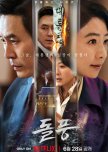
A Gripping Political Thriller with Stellar Performances and Intense Twists
The Whirlwind, a political drama, delivers a gripping, fast-paced narrative centered on Prime Minister Park Dong-ho and Deputy Prime Minister Jeong Su-jin as they engage in a high-stakes power struggle following an assassination attempt on a corrupt president. This 12-episode series shines with intense plot twists, morally complex characters, and stellar performances, making it a standout political thriller.The acting is exceptional, with Sul Kyung-gu’s charismatic portrayal of Park Dong-ho blending idealism with cunning, while Kim Hee-ae’s Jeong Su-jin is a formidable force driven by ambition. Their rivalry unfolds like a strategic chess match, each move calculated and thrilling. The drama maintains relentless momentum, weaving a narrative that critiques corruption and media manipulation without taking explicit political sides.
The Whirlwind excels in delivering a satisfying conclusion, with strategic sacrifices that leave audiences reflecting on the cost of power. It’s a must-watch for fans of intricate power plays and veteran performances, offering a compelling look into a corrupt political system.
Was this review helpful to you?

This review may contain spoilers
A Heartwarming, Empowering Drama with a Flawed Finish
Set in 1992 South Korea, A Virtuous Business tackles bold themes of female empowerment and sexuality against the backdrop of a conservative society. This quirky, heartfelt drama blends comedy, melodrama, and a touch of mystery, delivering a compelling narrative driven by the bonds of four remarkable women. While it shines in its character-driven storytelling and vibrant aesthetics, an uneven ending and underdeveloped subplots prevent it from reaching its full potential.At the heart of the story is Jeong-suk, a former beauty contest runner-up now living a modest life in the small town of Geumje. Struggling to make ends meet with her son, Min-ho, and her unfaithful partner, Seung-soo, Jeong-suk’s world shifts when she discovers Seung-soo’s affair. This betrayal sparks her journey of self-discovery, leading her to join Fantasy Lingerie, a venture selling adult products like lingerie, whips, and chains.
Jeong-suk teams up with Yeong-bok, a resilient mother of four, and later meets Ju-ri, a vibrant single mother and salon owner who embraces her femininity unapologetically. Rounding out the quartet is Geum-hui, a privileged yet unfulfilled housewife married to Won-bong. Together, these women form an unbreakable bond, navigating societal pushback, personal struggles, and hilarious mishaps as they peddle their provocative wares.
The show starts as a quirky comedy, with laugh-out-loud moments as the women awkwardly market their products. However, it gradually shifts into a sentimental, slow-burn melodrama, exploring deeper themes of self-worth, independence, and the pursuit of personal happiness.
Woven into the narrative is a mystery surrounding Do-hyeon, a detective new to Geumje, searching for his birth mother. Armed with only vague memories, burn marks on his arm, and a gut feeling, Do-hyeon’s quest intersects with Jeong-suk’s journey. Their budding romance is tender and heartfelt, grounding the drama’s more comedic and dramatic elements. However, the show’s attempt to juggle additional subplots dilutes its focus, contributing to its uneven pacing.
STRENGTHS: FRIENDSHIP AND EMPOWERMENT
The drama’s greatest asset is the chemistry among its four leads. Their friendship, reminiscent of Thirty-Nine but executed with greater warmth and authenticity, is the emotional core of the series. The writers skillfully shift the spotlight from Jeong-suk to the other women midway through, delving into their backstories and struggles. Yeong-bok and Geum-hui, in particular, face significant hardships, making their arcs feel especially poignant and impactful.
A Virtuous Business delivers a powerful message about embracing femininity and pursuing personal fulfillment, both sexually and in life. It educates its audience with sensitivity, challenging societal taboos while celebrating women’s strength and resilience. The show’s aesthetic complements its storytelling, with distinct set designs, well-crafted costumes, and a vibrant small-town atmosphere. Flashbacks are seamlessly integrated, and the soundtrack, featuring a quirky title track and soulful ballads, enhances the emotional depth. At a brisk pace, the episodes avoid overstaying their welcome, with sharp editing keeping the narrative engaging.
WEAKNESS: A DISAPPOINTING ENDING
Despite its strengths, A Virtuous Business stumbles in its final act. It falls victim to a rushed and unsatisfying conclusion. A time-jump trope disrupts the narrative flow, leaving several subplots unresolved. Yeong-bok’s marital arc, Ju-ri’s romantic prospects, and the future of Fantasy Lingerie are left ambiguous, while secondary characters, like Yeong-bok’s children, are sidelined entirely. This lack of closure undermines the show’s earlier momentum and sours its otherwise strong character work.
While Jeong-suk’s transformation from a timid housewife to a confident, independent woman is the drama’s central focus, it comes at the expense of the other characters’ development. By the end, Jeong-suk’s arc feels less compelling compared to Yeong-bok and Geum-hui’s, whose struggles carry greater emotional weight. The shift in Jeong-suk’s role, moving from self-discovery to supporting others, feels like an acknowledgment of this imbalance, but it’s not enough to fully redeem the uneven character focus.
FINAL THOUGHTS
A Virtuous Business is a delightful and empowering K-drama that blends humor, heart, and bold themes with a memorable cast. The friendship among its four leads, coupled with strong backstories and a vibrant aesthetic, makes it a standout. However, a disappointing ending and unresolved subplots hold it back from greatness. Despite its flaws, the drama’s infectious charm and meaningful message make it a worthwhile watch for fans of character-driven stories and female-led narratives.
Was this review helpful to you?
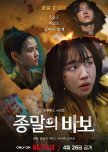
A Disorienting Yet Poignant Tale of Humanity’s Final Days
Goodbye Earth, a sci-fi dystopian series set in Woongcheon, South Korea, offers a gripping premise: humanity faces its final 200 days before an asteroid obliterates Earth. The show follows Jin Se-kyung, a former teacher turned volunteer, portrayed with heartfelt resilience by Ahn Eun-jin, as she navigates a crumbling society under martial law alongside her boyfriend. The narrative explores how people cling to hope, love, or vengeance in the face of certain doom, prioritizing human connection over apocalyptic spectacle. Yet, its ambitious storytelling is marred by initial narrative disarray, gradually finding its footing as it delves into profound human moments.The series shines brightest when it focuses on personal stories. Se-kyung’s quiet strength anchors the chaos as she fights to protect children caught in societal collapse. The ensemble cast delivers solid performances, bringing depth to characters grappling with despair, faith, or defiance. Visually, the show captures a gritty, grounded apocalypse, with scenes of looting, military crackdowns, and eerie normalcy that evoke the weight of impending doom. These moments of joy, sorrow, and connection feel authentic and moving, offering a fresh take on the end-of-the-world narrative.
However, the first three episodes present a disorienting experience, with a narrative structure lacking clarity and coherence. The plot jumps haphazardly between timelines without clear indicators, blending flashbacks and present-day scenes in a way that makes it challenging to follow the sequence of events. This lack of a clear timeline detracts from the viewing experience, leaving viewers struggling to engage fully. Additionally, the abundance of characters introduced early on adds to the confusion. While a large cast could enrich the story with diverse perspectives, many characters feel underutilized or underdeveloped, diminishing their impact on the overarching plot.
By the fourth episode, Goodbye Earth begins to coalesce. The timelines become more discernible, and the once-disparate characters start to intertwine in meaningful ways, creating a more cohesive and engaging experience.
As a philosophical drama with grand aspirations, the series overcomes its initial shortcomings to deliver a poignant exploration of humanity’s resilience and fragility in the face of extinction.
Was this review helpful to you?

This review may contain spoilers
A HEARTBREAKING YET BEAUTIFULLY CRAFTED FILM
*Uprising* is a heartbreaking yet beautifully crafted film that takes us on an emotional journey through the friendship of Jong-Ryeo and Cheon-Yeong, set in a time of brutal class divisions in historical Korea. The plot centers on how the rigid social hierarchy affects their lives, particularly Cheon-Yeong, a slave who is forced to endure countless hardships in place of Jong-Ryeo.What starts as a cruel situation, Cheon-Yeong being beaten in Jong-Ryeo’s stead, evolves into a deep bond. Despite the fact that Cheon-Yeong isn’t born a slave, his family’s downfall forces him into this role, and it's his strength and refusal to accept the established hierarchy that makes him stand out. When he begins secretly teaching Jong-Ryeo how to fight, the dynamics between the two change, leading to a friendship that feels genuine despite the social disparity.
However, the film doesn’t shy away from the harsh realities of their world. Even after helping Jong-Ryeo win a prestigious sword-fighting competition, Cheon-Yeong is denied his freedom by Jong-Ryeo’s father, who breaks the promise of releasing him from slavery. This betrayal deeply scars Cheon-Yeong, though Jong-Ryeo still tries to protect him by sending him off to fight the Japanese invaders, hoping this will finally earn him his freedom. The film is filled with these moments of hope and crushing disappointment.
After years of fighting, Cheon-Yeong returns home only to find the world he left behind in ruins. Jong-Ryeo’s family home has been burned down by the people who suffered under the oppressive rule of his father. In one of the film’s most gut-wrenching moments, Cheon-Yeong tries to save Jong-Ryeo’s wife and son from the flames, but she refuses his help out of pride, seeing him as a slave rather than a person who might save her life. Her death serves as a stark reminder of how deeply ingrained social prejudice was, even to the point of self-destruction.
The climax of *Uprising* sees a tragic reunion between Jong-Ryeo and Cheon-Yeong after seven years of separation. Jong-Ryeo, unaware of the full story, initially believes Cheon-Yeong is responsible for his wife and son's deaths. Their final confrontation is tense, but as the truth is revealed, the film shifts focus from their conflict to a bittersweet reconciliation. Just when they finally resolve their long-standing misunderstanding, Jong-Ryeo is mortally wounded in battle against the Japanese. Cheon-Yeong kills the Japanese leader, Genshin, in a satisfying act of revenge, but it’s too late to save Jong-Ryeo.
In Jong-Ryeo’s final moments, he asks Cheon-Yeong if they’re still friends, referencing an earlier lighthearted exchange from their youth. It’s a poignant moment that captures both the tragedy and beauty of their relationship. Despite everything that has happened, the film shows that love and loyalty can persist, even in death. This scene is devastating, but it offers closure, showing that their bond was real despite the cruel world they lived in.
On a larger scale, *Uprising* also critiques the corruption of the ruling class, embodied by King Seonjo, whose greed and cowardice lead to the suffering of the common people. His alliance with the Japanese and subsequent desertion of his own throne during the invasion sparks the uprising that defines the film. The subplot involving Seonjo and the infamous Japanese leader Genshin, known as the “nose-snatcher,” adds layers of historical context and brutality to the narrative. In a symbolic twist, Seonjo’s greed is punished when the treasure he’s promised turns out to be boxes of human body parts, noses, to be precise, reflecting the horrors of war and the consequences of his betrayal.
In the end, Cheon-Yeong and a few of his fellow survivors form a new community, symbolically named “Beom Dong,” meaning “A world together.” It’s a hopeful note to close the film on, but *Uprising* doesn’t let the audience forget the price paid for such unity. The film leaves you with a lingering sense that although there’s hope for change, the struggle against social inequality is far from over.
*Uprising* masterfully balances personal and political themes, offering a powerful meditation on friendship, loyalty, and the fight for justice. It’s a tearjerker that hits hard, especially as it reveals the lasting impact of societal divisions, even as it tries to inspire hope for a better future.
Was this review helpful to you?

A STYLISH BLOODBATH WITHOUT A SOUL
A stylish, action-packed revenge thriller with stunning visuals and brutal fight sequences. Toma Ikuta delivers an intense performance, but the film prioritizes action over depth, with thin storytelling and one-dimensional villains. Great for fans of high-energy combat but lacks emotional weight.What Works:
Visceral Action– The film’s fight choreography is top-notch, blending gritty hand-to-hand combat with stylized cinematography reminiscent of 'John Wick' and 'The Raid.'
Cinematography & Atmosphere– The streets of Shinjo City create a moody aesthetic that elevates the film’s tone. The world-building is immersive, which makes the setting feel like a character in itself.
Toma Ikuta’s Performance– While the script doesn’t offer much room for emotional complexity, Ikuta carries the film with his intense screen presence and physicality.
What Falls Short:
Thin Storytelling– The film prioritizes action over narrative, leaving character motivations underdeveloped. While the revenge arc is serviceable, the story lacks twists or depth that could have made it more compelling.
One-Dimensional Villains– The masked criminals are visually striking, but they lack personality or clear motivations.
Missed Emotional Connection– While the premise of a man waking up to find his world destroyed is gripping, the film never fully explores Shuhei’s grief or trauma. Instead, it moves quickly from one fight scene to the next, making it hard to connect with his journey beyond the surface level.
Final Thoughts:
*Demon City Oni Goroshi* is a slick, action-heavy thriller that delivers intense fight sequences and stunning visuals but lacks emotional weight. If you’re looking for a stylish revenge flick with relentless brutality, this is an entertaining watch. However, if you want deep storytelling and layered characters, it may leave you wanting more.
Was this review helpful to you?
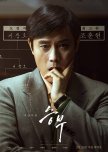
A Quiet Duel of Legacy and Pride
*The Match* is a compelling drama film based on the real-life relationship between two of South Korea’s most iconic Go players: Cho Hun-hyun and his protégé-turned-rival, Lee Chang-ho. Set in the early 1990s, the film traces their journey from a bond of deep respect and trust to a dramatic confrontation on the board that reshapes both their lives.The performances are the heart of this film. Lee Byung-hun is remarkable as Cho Hun-hyun, portraying a man torn between pride in his student and fear of being replaced. Yoo Ah-in brings a quiet intensity to Lee Chang-ho, expressing his character’s transformation from an obedient disciple into a confident and self-assured challenger. Their dynamic carries the film, grounding its emotional weight in realism and restraint.
The direction is subtle and patient. The film avoids melodrama, opting instead for a slow build of tension through deliberate pacing. The cinematography treats the Go board like a battlefield, using close-ups and careful lighting to give weight to every move.
One of the film’s strengths lies in its dialogue, which is thoughtful and philosophical. Lines like “A teacher is not someone who gives answers, but someone who opens the way” resonate far beyond the context of the game. The screenplay explores the loneliness of mastery, the burden of legacy, and the moment when every student must eventually step out of their teacher’s shadow.
There is also warmth and humor throughout the film, which balances the more intense moments. These touches humanize the characters and make their emotional journey all the more relatable.
It is a meditation on ambition, mentorship, and the bittersweet nature of growth. It’s a film that lingers because of the quiet, personal truths it reveals in the spaces between each move.
Was this review helpful to you?

Come for the Pretty Faces, Stay Because You Forgot Where the Remote Is
Crushology 101 kicks off with a dazzling premise: a young woman, freshly humiliated, decides that from now on, only gorgeous men are worthy of her time. Truly groundbreaking. If you ever wanted a show that promises emotional growth and then immediately forgets about it in favor of pretty faces, congratulations... you’ve found it.-> Story and Pacing:
The opening scandal is genuinely hilarious. But after that, the plot politely packs its bags and leaves. Bunny’s "handsome-only" rule is less about emotional healing and more about assembling the Korean drama version of a boy band. Growth is "teased" (if by teased you mean "mentioned and ignored"), and episodes start blending together into one long montage of Bunny blushing at different men.
-> Characterization:
Ban Hee-jin (Bunny) begins as someone you root for, until you realize she’s stuck on a hamster wheel of terrible decisions, and the script is too scared to let her get off.
The male leads (Ji-won, Jae-yeol, A-rang)? Icons of originality. We’ve got the brooding quiet guy, the smug flirt, and the sensitive artist - almost as if someone checked off a bingo card titled "Standard K-Drama Love Interests."
Their instant fascination with Bunny is truly touching, considering none of them know her beyond her tendency to trip over her own feet and stare dramatically into space.
-> Tone and Execution:
The show fully commits to its webtoon look, which is adorable until it’s supposed to get serious. Emotional scenes flash by so fast you’d think the editors had a hot dinner waiting. Any heartfelt moment is immediately buried under a mountain of cartoonish antics. Emotional stakes? Never heard of them.
-> Highlights (Such As They Are):
Bunny’s internal monologues are gold if you enjoy secondhand embarrassment.
Jae-yeol and Bunny actually have chemistry (an endangered species here).
Every once in a while, the show remembers it could be about self-esteem and body image... before getting distracted by another "accidental fall into a guy’s arms" scene.
-> Verdict:
Crushology 101 is colorful, chaotic, and as deep as a puddle. It’s the perfect background noise for folding laundry or wondering what more interesting dramas you could be watching. It’s just another webtoon adaptation you forgot you watched.
Was this review helpful to you?
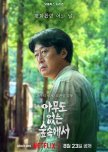
A frog (or frogs) dies from a stone thrown inadvertently
The Frog refers to an old Korean saying, “A frog dies from a stone thrown inadvertently”, which means people’s actions can have unintended negative consequences for others.“The Frog” is a pulse-pounding mystery thriller that seamlessly blends psychological tension with a high-octane narrative, making it a standout in the genre. Set across two distinct timelines, the series intricately weaves the fates of two men—Jeon Young-ha and Koo Sang-jun—whose lives are irrevocably altered by the presence of mysterious strangers and tragic events.
Young-ha, a reserved pension owner deep in the forest, finds his quiet life shattered when the enigmatic Yoo Seong-ha checks into his property. What begins as an innocuous visit quickly spirals into a nightmare as Seong-ha’s obsession with the pension pulls Young-ha into a game of manipulation, fear, and survival. Her presence is not just a disruption; it’s a catalyst for a series of increasingly disturbing events that push Young-ha to the brink.
In parallel, the series revisits the summer of 2000, where Sang-jun, a well-meaning motel owner, faces a different kind of horror. During the IMF crisis, a single act of kindness—offering a room to a stranded stranger—leads to an unthinkable tragedy that destroys his family and his livelihood. The show explores the psychological unraveling of Sang-jun as he grapples with guilt, public scorn, and the slow disintegration of his once-happy life.
Chief Yoon Bo-min, a tenacious detective who connects both timelines, adds another layer of tension as she digs into the mysterious happenings, driven by an intuitive sense of something deeply wrong. Her pursuit of the truth brings her dangerously close to the chaos surrounding both men.
The narrative is tightly wound, with each episode ramping up the stakes. The show is visually stunning, with beautiful mise-en-scenes that contrast the serene settings against the underlying dread.
One negative thing I found was that the transitions between the two timelines were not very seamless and can be confusing at first.
The terror comes from within—how far ordinary people can be pushed before they break.
In essence, “The Frog” is a suffocating, high-stakes drama that examines the devastating consequences of guilt, obsession, and the human capacity for both resilience and destruction. It’s a ride that leaves you breathless, with each episode escalating in intensity until the explosive conclusion.”
Was this review helpful to you?
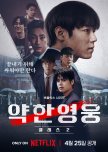
A Brutal, Thrilling Sequel That Forgets What Made It Special
"UPDATED REVIEW"I went into Weak Hero Class 2 with pretty high expectations, and while it definitely delivers a gripping continuation, I can’t say it completely lived up to the raw brilliance of Season 1.
On the surface, everything is bigger, and honestly, it’s impressive. Yeon Si-eun’s journey into a new school full of new dangers had me invested from the start. Watching him, Hu-min, Hyun-tak, and Jun-tae slowly forge a bond was probably the emotional highlight for me. Their brotherhood felt messy and real, full of guarded trust and bruised hearts. That part? The show absolutely nails it.
But where Season 1 thrived on slow-burn tension and devastating emotional buildup, Season 2 sometimes trades that for spectacle. The fights are frequent, beautifully choreographed, and absolutely brutal - but they’re also a little too polished at times. Some of the raw, desperate edge that made the first season so unforgettable feels sanded down here. It’s more "cool" than "gut-wrenching," and personally, I missed that rawness.
Another thing: the pacing feels uneven. The first half does a great job building new dynamics and setting up emotional stakes, but as the action ramps up, some of that careful character work gets sidelined. The heart is still there - it's just buried a little deeper under all the chaos.
That said, the performances are phenomenal. Ryeoun, especially as Hu-min, is magnetic. His layered performance brings a much-needed emotional anchor when the plot starts to sprint ahead. And Park Ji-hoon continues to be quietly devastating as Si-eun, managing to say so much with so little.
At the end of the day, Weak Hero Class 2 is a strong continuation that dares to expand its world, even if it sacrifices some of the emotional intimacy that made its predecessor special. It’s still absolutely binge-worthy - tense, brutal, and sometimes heartbreakingly honest - but it doesn’t quite reach the same unforgettable heights.
For me, it’s worth watching. Worth feeling a little heartbroken over. But not quite the masterpiece that the first season was.
Was this review helpful to you?
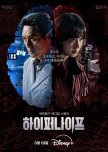
This review may contain spoilers
WHEN THE SCALPEL SLIPS
Hyper Knife begins like a cold, precise surgical instrument: sharp, deliberate, and thrilling in its control. It’s a female-led psychological thriller set in the morally compromised world of underground neurosurgery, anchored by the combustible pairing of Park Eun-bin and Sul Kyung-gu. She is a prodigy with a scalpel and a dangerously fragile sense of morality; he is the mentor-turned-rival who matches her brilliance but clashes with her principles. From the first episode, the series exudes confidence. The surgical sequences are eerie and intimate, the score pulses like a racing heartbeat, and the dialogue slices with a surgeon’s certainty. The first four episodes are a masterclass in tension, every operation doubling as a psychological duel.Then, midway through, something shifts. The slow, methodical dissection of character and motive gives way to a rush of reveals and shortcuts. Motivations that deserved careful exploration are abruptly explained in passing, as if the show were hurrying to clear the board rather than deepen the game. This is where the writing, so taut in the beginning, starts to loosen. The tonal precision that made the first half so gripping begins to fray.
By the finale, the collapse is complete. What should have been a cold, surgical reckoning swerves into emotional reconciliation, sentimentality, and a kind of sappy melodrama that feels at odds with everything the show had established. The moral stakes suddenly feel arbitrary, forgiveness is granted without the groundwork to make it convincing, and key threads are left dangling. The final confrontation, built up with such promise, fizzles into an ending that blunts its own edge.
And yet, even at its weakest, Hyper Knife never stops being watchable, largely because of its leads. Park Eun-bin is magnetic, a “gloriously unhinged queen” whose crazed eyes and unnerving calm are impossible to look away from. Sul Kyung-gu matches her beat for beat, their scenes together simmering with the tension of admiration and betrayal. The cinematography and score maintain an operatic, surgical tension, turning even the most implausible moments, like a barefoot, blood-spattered operation, into something unforgettable.
In the end, Hyper Knife is a paradox: intoxicating in the moment, but oddly hollow in retrospect. It promises a scalpel’s cut and delivers it in the first half, only to pull back when the blade should have gone deeper. Watch it for the performances, the mood, and the thrill of its opening episodes, but be prepared for a finale that dulls the edge it worked so hard to sharpen.
Was this review helpful to you?
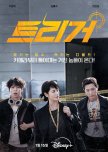
Fun fact (In case you're curious about the real cases):
Episode 1: The case of 'Agadongsan' (아가동산) and 'O DaeYang Corporation' (오대양) -- Cult and mass sui****Episode 2 and 3: 'Incheon Dongchun-dong elementary school student kidnapping and murder case' and 'Edmund Kemper' (2 grandparents murdered (when he was a minor), 8 serial murders and time (including biological mother)
[Culprit of Incheon case will be released on April 12, 2030]
Episode 4: 'Deux's Kim Sung-jae's suspicious death case' and 'Kim Bo-eun and Kim Jin-gwan case' (The victim was subjected to long-term SA by the defendant before the murder.)
[Kim Jin-kwan: 7 years in prison ( reduced to 2 years and 6 months on March 1993 , released around 1994 )
Kim Bo-eun: 5 years in prison (pardoned in March 1993)]
Episode 5: Collapse of demolished building in Hakdong, Dong-gu, Gwangju Metropolitan City (9 deaths and 8 injured)
Episode 6 and 7: The incident of Cho Joo-bin's accomplice stalking his homeroom teacher -- Student who conspired with Cho Joo-bin of ‘Nth Room’ to commit murder.
Episode 8 to 12: Deux's Kim Sung-jae's suspicious death case
Now the short review of the drama:
Unmasked delivers a gripping mix of crime, suspense, and dark humor. The sharp writing and unpredictable twists make every episode intense and addictive.
Strengths:
- Fast-paced, no fillers
- Smart dialogue & dark humor
- Unpredictable twists & emotional depth
Weaknesses:
- Slightly rushed finale
- Some side characters are underdeveloped
VERDICT: A must-watch for thriller fans. Engaging, thrilling, and unforgettable.
Was this review helpful to you?

Chaotic Fun, But Rough Around the Edges
Kian’s Bizarre B&B is exactly what the title promises - a strange, offbeat, and at times hilariously chaotic variety show that blends celebrity charm with social awkwardness.The biggest draw here is the chemistry between the cast. Jin, despite his global fame, slips comfortably into the awkward, low-budget mayhem that defines the show. He’s funny, unexpectedly sharp, and brings a grounded warmth to the mess. Kian84, with his eccentric ideas and strange logic, drives most of the unpredictability. Ji Ye-eun, while more reserved, adds a balancing energy and is gradually warming up.
What really works is the unpredictability. You never know what kind of random “project” Kian will suggest next.
However, the show feels more awkward than entertaining in the early episodes. The pacing drags at times, with scenes that feel under-edited or stretched too thin. There’s a sense of disorganization - not the fun kind, but the frustrating kind.
The editing also deserves critique. There’s little rhythm or narrative flow. Instead of a cozy slice-of-life vibe, it sometimes feels like a YouTube vlog that hasn’t been tightened up for broadcast.
Still, there are moments of quiet humor, genuine warmth, and unexpected hilarity. It is worth checking out. It's a variety show that doesn’t try too hard to impress; it just lets the chaos unfold. And that’s oddly refreshing.
Was this review helpful to you?
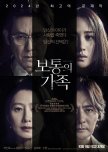
WHEN LOVE TURNS TO LIES
*A Normal Family* is a taut, emotionally charged thriller that thrives on psychological tension rather than explosive action.What stands out most is the suffocating atmosphere. The film’s confined spaces, like upscale restaurants, sterile law offices, and tense family dining rooms, mirror the characters' mounting anxiety. The camera often lingers uncomfortably on faces, capturing microexpressions that betray suppressed panic or calculated control. This slow-burn approach builds an oppressive tension that makes the characters' moral descent feel disturbingly realistic.
The performances are stellar, particularly from the parents, whose escalating desperation feels painfully raw. The contrast between the brothers, one calm and methodical, the other emotionally volatile, drives much of the conflict. The film smartly avoids clear-cut villains, instead exploring how even the most well-intentioned people can justify dangerous decisions when cornered.
While *A Normal Family* isn’t heavy on twists, its strength lies in how deeply it immerses viewers in its characters' moral turmoil.
In short, it's a psychological thriller that prioritizes character complexity over fast-paced action.
Was this review helpful to you?
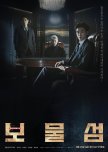
A promising thriller that forgets what it was trying to say
*Buried Hearts* markets itself as a slick revenge thriller drenched in corporate corruption, memory loss, and familial secrets. And to be fair, it starts that way. But as the story unfolds, the show loses not only its narrative grip, but also its own identity.The early episodes are compelling. A secret slush fund, a shadowy professor pulling political strings, and a lead character with amnesia - there’s no shortage of tension. But the writing quickly shows cracks. Instead of escalating the drama, the plot circles back on itself repeatedly, bogged down by overused tropes (amnesia again?) and characters who stop evolving after episode three.
There’s a frustrating lack of depth in how the show handles its core themes. Power, memory, guilt - these are fertile grounds for psychological drama, but *Buried Hearts* rarely digs deeper than surface-level reveals. Characters tell us how they feel; the show doesn’t show us. The narrative doesn’t trust its audience to interpret nuance, so it spoon-feeds motivation through long, expositional dialogue.
The drama leans heavily on twists, but few of them land. A late-game near-incest plotline feels like a desperate attempt to inject shock value, only to be reversed quickly. The big reveals often feel more like filler than payoff - contrived rather than earned.
By the final third, the show is barely holding together. Pacing becomes a major issue. Scenes drag. Characters lose their edge. The revenge plot, which should intensify, flattens under political subplots and boardroom infighting that lack emotional stakes. What could have been a tight 12-episode series overstays its welcome across 16.
Park Hyung-sik does his best with what he’s given, but the script boxes him into a narrow emotional range. Dong-ju’s amnesia is used more as a reset button than a way to explore internal conflict. Hong Hwa-yeon, while understated and watchable, is underutilized, especially in the second half where her arc plateaus into passivity.
Even Huh Joon-ho, playing the morally gray puppet master Yeom Jang-seon, is reduced to a repetitive mouthpiece for exposition rather than a compelling antagonist.
The direction is clean but lacks distinct style. There’s none of the visual storytelling or atmospheric flair that defines standout K-thrillers. Music is overbearing, often cueing emotion instead of letting the scene breathe. And while the sets are appropriately cold and corporate, the lack of variety becomes visually monotonous.
Final Thoughts:
*Buried Hearts* has all the ingredients of a high-stakes melodrama, but it lacks cohesion, restraint, and most importantly, soul. The show wastes its premise, dulls its tension with repetition, and leaves its audience more frustrated than satisfied. What could have been a biting commentary on greed and identity ends up as just another forgettable entry in the ever-growing list of K-dramas that promise more than they deliver.
Was this review helpful to you?

 26
26 37
37 4
4 2
2 2
2 4
4 5
5 4
4 7
7 1
1 3
3 3
3 1
1 2
2 1
1 3
3 1
1 2
2 1
1 1
1 1
1 3
3 10
10 2
2 5
5





















